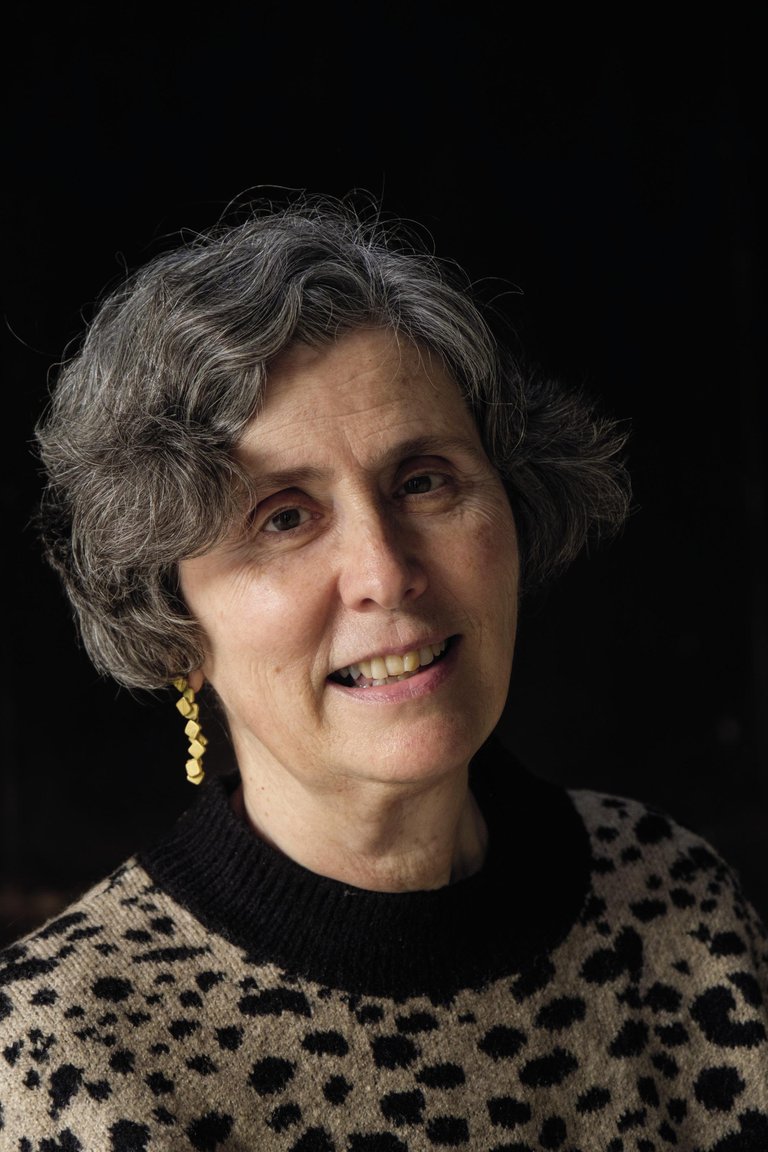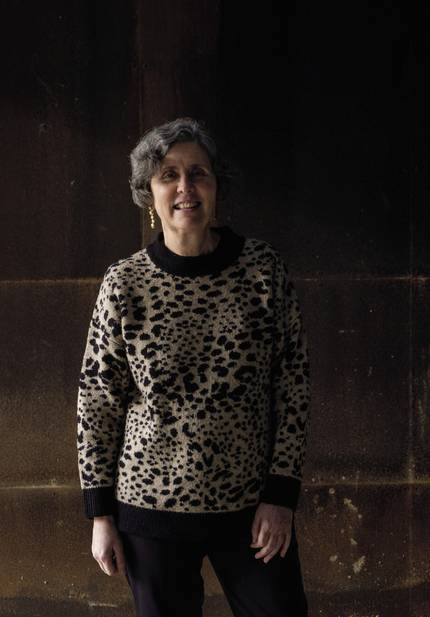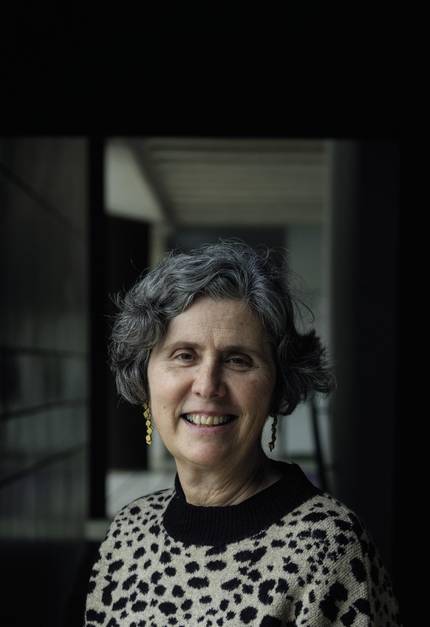“More than spider, science looks like rhizome.”
Many experts have said that the management of the COVID -19 crisis would be better if, together with health-related researchers, they had also worked in other areas such as sociologists, behavioural psychologists and anthropologists.
Mari Luz Esteban Galarza (Pedrosa de Valsportres, Burgos, 1959) studied medicine, but she soon went to anthropology, and since then she has devoted herself to feminist anthropology. It currently coordinates the Feminist Anthropology Research Group (AFIT) at the UPV. He says that anthropology is considered a secondary science in the science system, but both in the research team and in the work performed outside the university tries to influence and generate new questions. He often speaks in plural of his work, highlighting the importance of working together and in team.

As a young man, I studied medicine, and when I finished, I didn't really know what to do. I was in the feminist movement in Basauri, and the opportunity to go into family planning arose, and I found it timely. So I worked there for six years, but the situation was very special, because I wasn't a gynecologist. I didn't want to do specialization, and I got into anthropology. It's true that I've worked on health-related issues, especially at the beginning, and I'm also in the anthropology of medicine, and today I tend to teach a lesson about that.
Otherwise, medicine and anthropology are two very different sciences. Anthropology is a human or social science that, in addition, is found on a certain periphery in the system of science in general. However, in Euskal Herria social anthropology has had and has its place, but in the science system it is secondary. The situation is special. In my case, I also put myself in medicine in a fairly subordinate place, and then I've entered a science that's subalternating with the science system. I've stayed in subalternity with science, and there I'm comfortable.
Science is a regulated and organized way of building knowledge in a community. Simplifying, we would say it's something like this. From the point of view of anthropology, all the sciences that arise in different cultures are ethnotions, since they are produced by a certain group, in a given social organization, although the ethnotions are among themselves in a hierarchy of powers.
What we call the science system, for its part, would be completed by universities, research centers, etc., and there is also an international hierarchy. But I think when we talk about the science system, we represent a differentiated compartment and it's not. Science is integrated into society.
Going back to the definition, we have said that knowledge is a way to build, but through it it it is defined what man, society and relations between human beings…always in interaction with an econom-political system. Therefore, the function of science is not only to know it, but to define, classify and organize it. The example of medicine is very clear. From medicine comes how we understand the body, gender, health, disease, what is normal and what is not… All that is also a function of science.
So there are institutions like, in our case, research centers that have names in the scientific system, but science has many branches, many grips. Thus, knowledge comes not only from institutions, but also from society, from collaboration between institutions and citizens... Therefore, more than the aspect of the spider web, it would look like rhizome, as I imagine. [Rhizomatic in the Lucian sense]. Of course there are hierarchies, but also any element can influence any other, and the ramifications are very varied.
It's a very complex question. For whom? It depends on where you are. For example, we, in the feminist anthropology of Euskal Herria, for whom do we work? To start with, for us, we have a salary and we live pretty well in general. And then for society: to create better social relationships, to reduce inequalities, to generate knowledge in those areas -- based on their own interests. How does it affect you? I don't know. Can we measure it?
What influence does my work have, for example? We can measure the number of publications I publish and the number of researches, this is quantifiable and done. But my influence, surely, is much more complex and difficult to measure. Who am I working for? For society, I would say, to create another knowledge, even to create a knowledge that is against hegemonic knowledge, or that is next to it.
In applied anthropology, there are some questions you work on. In my work it is also like this: in society there are some questions that we try to answer. In addition, our job is to create new questions, create new perspectives to look at the world… Does that seem applicable? Maybe so. And its use can be varied. It can be to help people, but it can also be to classify them.
They are clearly buried. Now some names are mentioned and some scholarships are named for some women… That's OK. But these are exceptions. And also, it has a difficult solution. This has been seen with COVID 19. At our university, for example, we would say that there's a degree of parity or we're not that bad. But then there comes a situation like this, and the data shows that the scientific production of women and men has nothing to do with it. And when they've been home, for example, a couple -- with their daughters, both at the same level -- it's been shown that in the care of their daughters, they haven't had the same participation.
In fact, I don't think we can imagine what parity is. In the images that create equality policies (which want to be pedagogical), women and men are often at the same level… but the reality is not. So we need numbers, how many women, how many men, and then you realize what happens.
In any case, I think women have to be in science. As in politics: we have to be in institutional politics, but from outside there are also ways to do it. For example, in feminism there are centers that research, outside universities, generating common knowledge.
In the AFIT-Feminist Anthropology Research Group we are officially 17 researchers and more people around. [Anthropologists and sociologists]. To some extent we have the power to do things. And yet, you must always be attentive to maintain and not lose what you have. So part of my job is to see where the attacks and problems come from, and to protect or find them, because our place is not stable. It's unstable in general, but especially for women.
I am in a network, Redcaps, which brings together health and gender, in which we are many professionals from all over the state, especially health, but also social sciences. And now comes the conflict about transsexuality, and there's a lot of polarization. The theme of transsexuality is a good example to reflect on feminist science and science. In our case, the situation has been very complicated, but I think that to start with, we need to think about what unites us and then build alliances. Although opinions differ widely, we must be able to establish alliances.
Because the science that I want to do, to start with, has to be inclusive, that is, you have to recognize everyone who is on the same level as everyone. On the other hand, it should not be pathological. In addition, it must be understood that knowledge is moving, there are no dogmas. And some people find it hard to understand and accept.
Another important point for us is that people's voices are very important. And that's not always easy. For example, in medicine it puts you in an uncomfortable situation, because the patient can question what you said. In the case of transsexuality, a doctor can say this and others, but then the transept will say theirs.
It is true that in the anthropology of medicine it is easier to recognize complexity and variety. In clinical medicine, on the contrary, it is necessary to respond to the consultation and may not always be so easy. That is understandable, but in the case of transsexuality, for example, some use science as a tool to maintain its status. According to them, the reasons to support their ideology are scientific and not so. That's not science.
Yeah, that's it. We are far from there. We try to provide some input to society, to generate questions, to give some weight, to offer other perspectives to look at reality... And it seems very important to me to protect what we do and our place, although somehow we are on the periphery. We're simple, but from here we can also do something.
Being critical, I believe that feminism has not managed to situate itself in the crisis of COVID -19, on a global level, I mean, on some issues yes. I am quite convinced that we have not been able to offer anything to society.
Industrialized countries have also been proudly accused of not taking into account the lessons of other countries, such as death, Ebola outbreaks.
Not only that. I have a friend anthropologist Almudena Marí Sáez, who works at a public health institute in Berlin. Here anthropologists do not usually work in public health groups, but there they do. He studies in West Africa, with Ebola, hemorrhagic fever and now with COVID -19, among others, and collaborates with biologists, doctors, nurses and other scientific disciplines.
Before COVID 19, he told me, for example, that when they put the dead with Ebola in those bags, without any sense, the legs couldn't accept. So they had to negotiate what to do with the dead, and they had to give in on some things.
That seems like thinking. They negotiated in Africa and we have not been able to negotiate anything here. And that's written and published in international scientific journals. We have been proud, we have not taken advantage of anything and not just death. Another study narrated how citizens' networks have been used for prevention. We, for our part, have been here improvising and those on the left. We have a lot to learn, but to do so we have to change our attitude.
Buletina
Bidali zure helbide elektronikoa eta jaso asteroko buletina zure sarrera-ontzian













